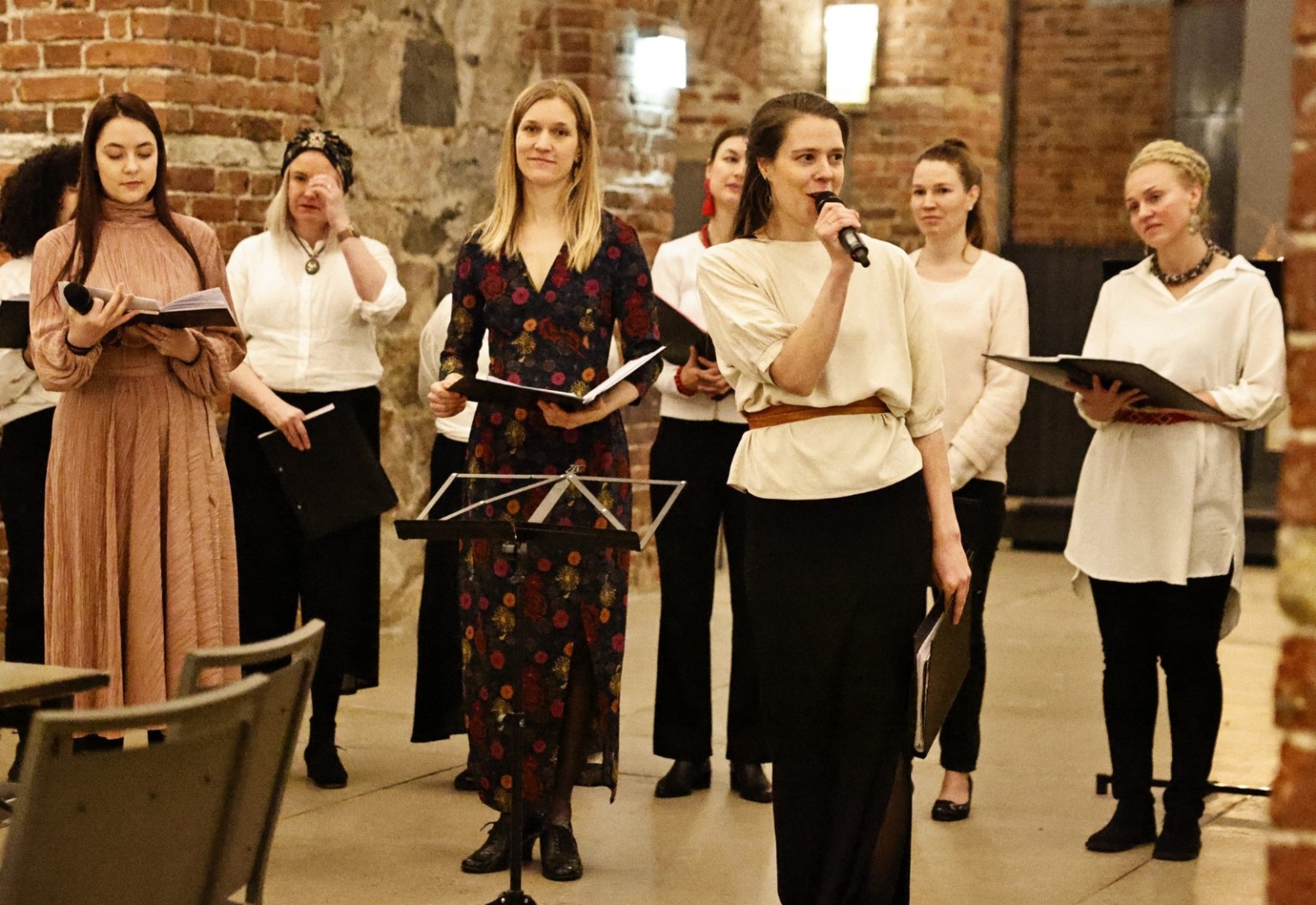Helsinki-based choir conductor and educator Saara Ruuska talks about the ‘Ukrainian voices’ project, where singing brings together people from various countries.
“Whenever Ukrainian people come together, they sing.” So said my Ukrainian-born friend Uliana Burdina when I asked her about the meaning of music. I believe that singing is a powerful tool for bringing people together and for forging connections, and not just for Ukrainians. The purpose of the Ukrainan äänet [Ukrainian voices] project funded by the Kone Foundation is to facilitate encounters and communality through Ukrainian and Finnish songs.
Project kickoff with a communal kolyada feast
The multicultural Maailma-kuoro (World Choir), working with Ukrainian local associations and other partners, organised a communal kolyada feast in Helsinki, Tampere and Turku in January. Kolyada is a term in several Eastern Slavic languages referring to the Christmas holidays, which according to the old Julian calendar is the two-week period starting with our Epiphany. The term also refers to the sacred folk songs that are sung during the Christmas holidays.
We wanted to make our kolyada feasts easily approachable and cordial events where people could meet new acquaintances and also participate in the singing. Ukrainians were given free admission; the proceeds from ticket sales to other participants were donated to aid civilian victims in Ukraine.
Inclusion fosters meetings
The project is based on the principle of inclusion, which works on various levels. New Ukrainian singers were recruited, and the Ukrainian feast was produced as a joint effort. Even in the preparatory stages, stories and encounters in the context of music and food brought people together. Musical and spatial arrangements were devised in such a way as to lower the threshold between audience and performers. The choir sang in Ukrainian and Finnish: the pairs of works that I selected functioned as windows between two cultures, in both directions.
Each of the three events was sold out, and each was a unique experience combining things that for myself personally are important and meaningful: communality, learning, and being heard and seen.
Future repertoire guided by Ukrainian song requests
At these kolyada events, we polled Ukrainian participants to find out which Ukrainian song they would like to hear in concerts in autumn 2023.
It is now May, and I am listening to the requested Ukrainian songs and arranging them for choir. I am also meeting Ukrainians living in Finland to talk with them about music. I am considering voicings and searching for Finnish works to pair with these Ukrainian songs. The connections may be musical or thematic. As at the kolyada events, I want to have singing in Finnish too. This combination of musical and linguistic cultural exchange arose from a wish voiced by the Ukrainian diaspora in the very early days of the project.
A choir as a meaningful community
I have conducted the multicultural Maailma-kuoro since I established it in 2010, but the Ukrainan äänet project has allowed this already vibrant musical community to grow and expand in new, meaningful ways. It was one of the finest moments of my career to date to conduct Ukrainian Christmas songs with this community. When the choir sang in Ukrainian and sounded brilliant, I could see the special light that it kindled in the eyes of both the singers and the Ukrainians in the audience.
I now have material that not only lists requests for more than 100 individual songs but also demonstrates what these songs mean for the people who requested them. The Ukrainan äänet concerts this autumn will again bring together people from diverse backgrounds and will include songs that are important to many, along with the stories behind those songs.
Saara Ruuska is a Helsinki-based choir conductor and educator. She leads the Ukrainan äänet [Ukrainian voices] project funded by the Kone Foundation. The next concerts will be held at the Savoy Theatre in Helsinki on Monday 27 November; at Sigyn Hall in Turku on Wednesday 6 December; and in Tampere in late 2023 or early 2024.
For more on this topic, visit the panel discussion ‘Increasing Multicultural Choirs’ at the Tampere Vocal Music Festival, in the foyer of Tampere Hall on Saturday 17 June 2023 at 15.00–16.00.
Photo: Jan Nordblad

